| ||
|---|---|---|
Bybit | KuCoin | |
Supported Coins | +650 | +700 |
Spot Trading Fees | 0.10%
For both maker and taker orders. The more you trade, the lower the fees – can decrease to as low as 0.02%. Using Bybit's native token, BYD, to pay trading fees offers a 20% discount | 0.10%
For both makers and takers. For VIP users, fees can drop as low as 0.03% for takers and -0.005% for makers. Using KCS to pay trading fees offers a 20% discount |
Future Trading Fees | 0.025% – 0.075%
0.075% for taker trades and 0.025% for maker trades. Using Bybit's native token, BYD, to pay trading fees offers a 10% discount | 0.02% – 0.06%
0.02% for taker trades and 0.06% for maker trades. For VIP users, fees can drop as low as 0.03% for takers and -0.01% for makers. Using KCS to pay trading fees offers a 20% discount |
Our Rating |
(2.9/5) |
(3.6/5) |
Read Review | Read Review |
Bybit vs. KuCoin: Compare The Best Features
In this comparison, we'll be analyzing Bybit and KuCoin, two popular cryptocurrency exchanges, to help you understand their key differences.
We'll cover features like ease of use, cryptocurrency selection, Web3 integration, and advanced trading options.
Whether you're a beginner or an experienced trader, this guide will help you choose the platform that best suits your needs.
-
Ease of Use & Mobile App Experience
Bybit offers a clean, user-friendly interface, especially for spot trading. Beginners may find the platform’s design intuitive, though advanced features like futures and margin trading can be overwhelming.
However, Bybit’s mobile app mirrors the desktop experience, making it convenient for users on the go.
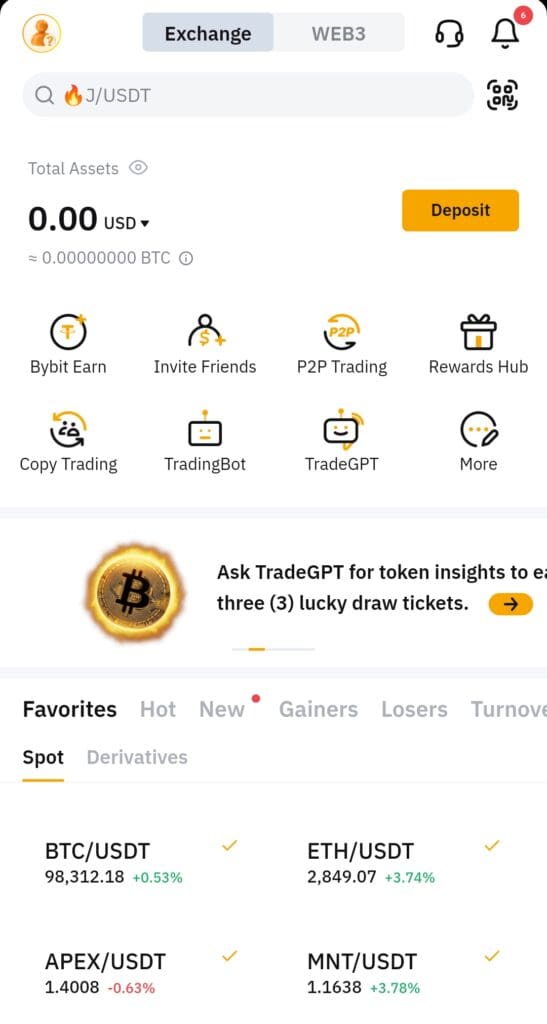
KuCoin, on the other hand, strikes a balance between simplicity and complexity. Its interface is straightforward for basic trading, but newcomers may feel lost when using its more advanced tools like margin or futures trading.
KuCoin’s mobile app is well-rated and offers a seamless trading experience, providing full access to its features.
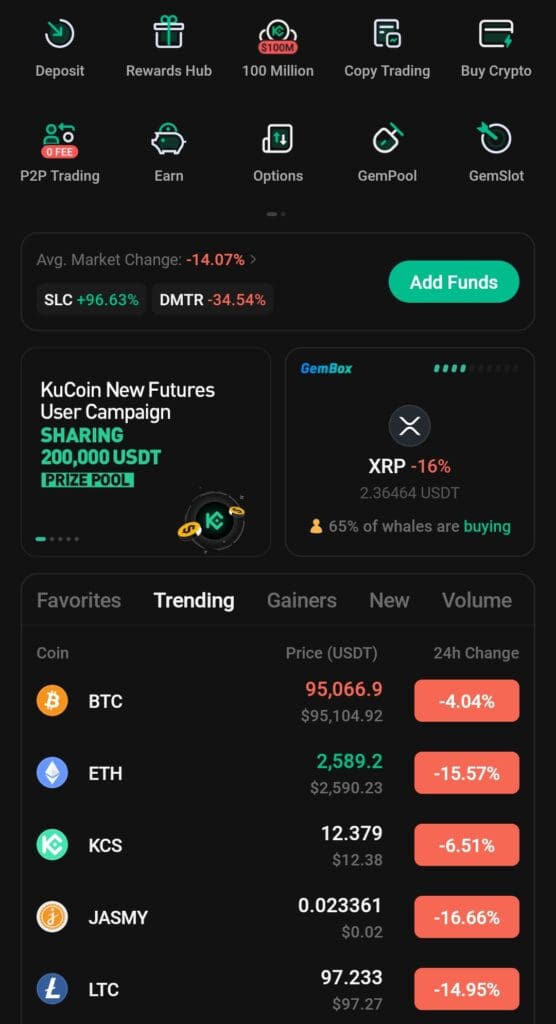
Overall, both platforms offer solid mobile experiences, but Bybit’s app is slightly more streamlined for beginners, while KuCoin offers greater versatility for more experienced users.
-
Cryptocurrency Selection
Bybit supports +650 cryptocurrencies, including top coins like Bitcoin and Ethereum, along with altcoins and NFTs. This wide selection, especially its NFT marketplace, caters to users looking to diversify.
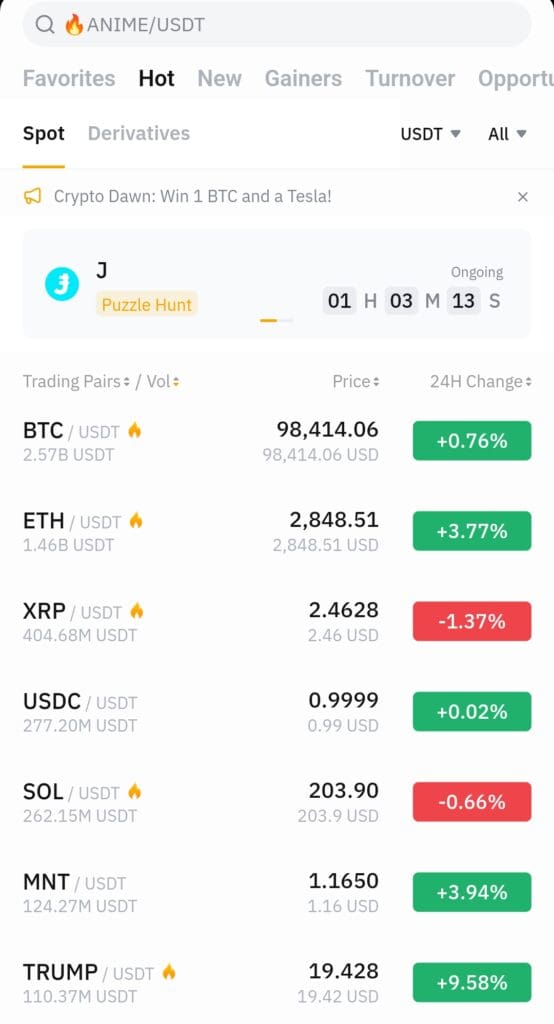
KuCoin excels in this category, offering +700 cryptocurrencies, including a large number of altcoins, stablecoins, and DeFi tokens. KuCoin’s range also includes some lesser-known, high-potential tokens.
-
DApps and Web3 Integration
KuCoin, meanwhile, integrates well with Web3 through its KuCoin Community Chain (KCC), allowing users to interact with decentralized apps (dApps) and DeFi platforms.
Its KuCoin NFT marketplace also provides users with early access to some exciting blockchain-based games and collectibles.
Bybit has made a significant move into the Web3 space with its NFT marketplace and integration with Web3.
Users can trade Ethereum and Solana-based NFTs directly and access decentralized finance (DeFi) services via the platform’s integration with dApps.
However, its Web3 features are still in development and may not be as robust as some other platforms.
-
Staking Options and Rewards
Bybit offers on-chain staking with competitive APRs. Additionally, Bybit provides Launchpool opportunities, allowing users to stake assets like USDT and MNT to earn rewards in new tokens .
KuCoin offers a broader selection of staking options and additional benefits, making it a more versatile choice for users seeking diverse rewards.
It provides a diverse range of staking options through its KuCoin Earn platform, including ETH 2.0 staking, KCS staking, and various fixed-term products.
KCS staking offers daily rewards and additional benefits like trading fee discounts and VIP perks.
-
Trading Crypto Features & Experience
Bybit offers a comprehensive suite of advanced tools, such as margin and futures trading, with up to 100x leverage.
Its copy trading feature allows users to follow successful traders, which can be especially helpful for beginners looking to replicate profitable strategies.
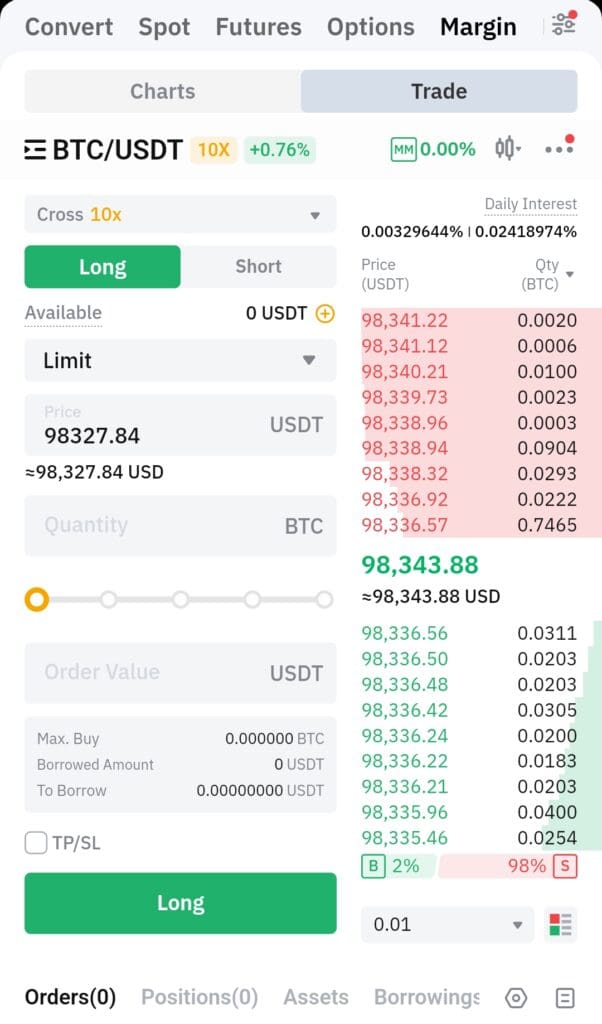
KuCoin, similarly, offers margin and futures trading but with a slight edge in lower fees for high-volume traders.
Additionally, KuCoin’s trading bots and KuCoin Spotlight (for early access to promising crypto projects) provide more ways to automate strategies and earn from new tokens before they go mainstream.
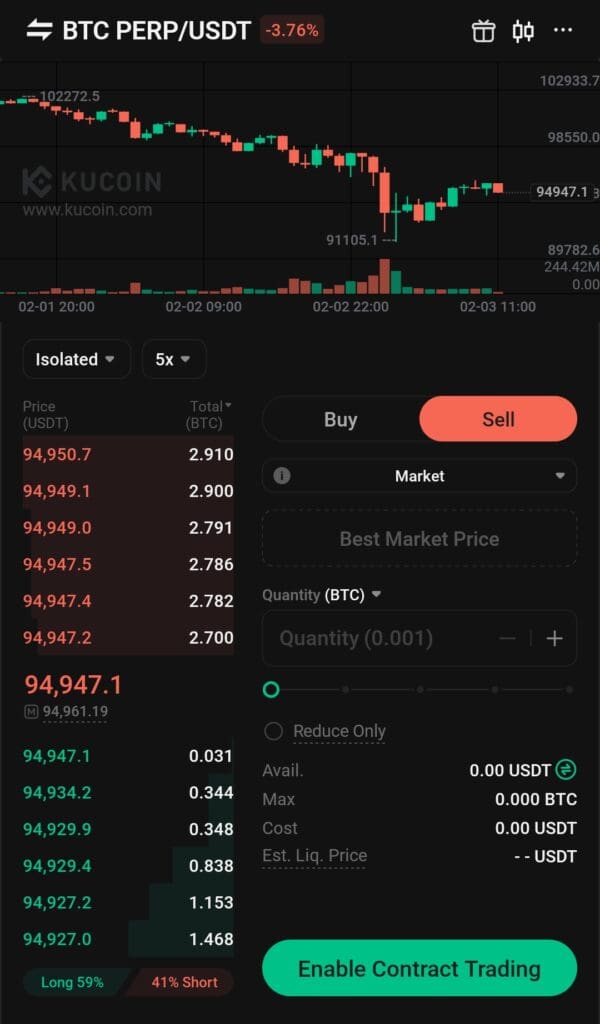
Bottom line, Bybit excels in leverage options and copy trading, while KuCoin offers a broader range of automation tools, lower fees, and early access to token sales, making it a more versatile choice for active traders.
-
Wallet Options
Bybit offers a Web3 Wallet with both custodial and non-custodial options. The custodial wallet is linked to an exchange account, while the non-custodial wallet gives users full control over their private keys.
KuCoin does not provide an integrated wallet solution.
However, it supports integration with various third-party wallets and emphasizes security features like saved addresses to prevent withdrawal errors .
-
Trading Bots and Automation
KuCoin offers a range of trading bots, including Grid Bots, DCA Bots, and Martingale Bots. These bots cater to various trading strategies and are designed to automate trading processes, reducing the need for constant monitoring .
Bybit provides a suite of trading bots, including Spot Grid, DCA, and Futures Grid bots.
These bots allow users to automate trading strategies, such as dollar-cost averaging and grid trading, enhancing trading efficiency .
-
Security Measures And Past Hacks
Bybit experienced a significant security breach in February 2025, resulting in the theft of approximately $1.5 billion worth of Ethereum.
The breach occurred during a routine transfer between cold wallets, where attackers manipulated the transaction process.
KuCoin detected a supply chain attack in February 2025 targeting users of major centralized exchanges.
The attack involved malicious dependencies, but KuCoin's security team responded swiftly, preventing significant damage.
Who Should Consider Bybit Exchange?
Bybit is ideal for experienced traders looking for advanced features and high-leverage trading options. Here’s who may benefit from Bybit:
Active Traders: Bybit’s low fees and high-leverage options make it an excellent choice for active and experienced traders.
Futures & Margin Traders: The platform excels in offering futures and margin trading with up to 100x leverage.
Copy Traders: Bybit’s copy trading feature lets less-experienced users follow top traders.
Crypto Enthusiasts: With support for a wide variety of cryptocurrencies and an NFT marketplace, it’s great for those exploring diverse assets.
Who Should Consider KuCoin Exchange?
KuCoin caters to a diverse group of crypto traders, from those looking for passive income opportunities to those exploring altcoins. Here's who should consider KuCoin:
Altcoin Enthusiasts: KuCoin offers access to over 700 cryptocurrencies, making it a great choice for users focusing on altcoins.
Passive Income Seekers: With options like staking and lending, KuCoin allows users to earn rewards from their crypto holdings.
Advanced Traders: The platform’s range of advanced trading tools such as margin and futures trading makes it suitable for experienced users.
Global Traders: Available in over 200 countries, KuCoin supports a wide variety of fiat and crypto deposit options.
Bottom Line
Bybit excels in high-leverage futures and margin trading, making it a solid choice for active traders and professional investors.
KuCoin, on the other hand, is more diverse with its wide selection of altcoins, passive income options, and global availability, making it ideal for investors interested in altcoin diversity and earning through staking or lending.
Both platforms cater to experienced traders, but KuCoin offers more variety and opportunities for passive income.
